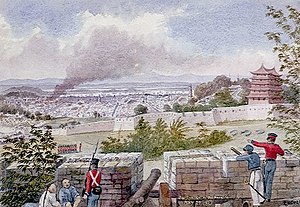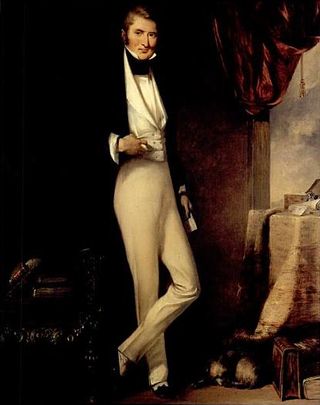
William Jardine was a Scottish opium trader and physician who co-founded the Hong Kong–based conglomerate Jardine, Matheson & Co. Educated in medicine at the University of Edinburgh, in 1802 Jardine obtained a diploma from the Royal College of Surgeons of Edinburgh. The next year, he became a surgeon's mate aboard the Brunswick belonging to the East India Company, and set sail for India. In May 1817, he abandoned medicine for trade.

The Treaty of Nanking was the peace treaty which ended the First Opium War (1839–1842) between Great Britain and the Qing dynasty of China on 29 August 1842. It was the first of what the Chinese later termed the "unequal treaties".

The First Opium War, also known as the Anglo-Chinese War, was a series of military engagements fought between the British Empire and the Qing dynasty of China between 1839 and 1842. The immediate issue was the Chinese enforcement of their ban on the opium trade by seizing private opium stocks from mainly British merchants at Guangzhou and threatening to impose the death penalty for future offenders. Despite the opium ban, the British government supported the merchants' demand for compensation for seized goods, and insisted on the principles of free trade and equal diplomatic recognition with China. Opium was Britain's single most profitable commodity trade of the 19th century. After months of tensions between the two states, the Royal Navy launched an expedition in June 1840, which ultimately defeated the Chinese using technologically superior ships and weapons by August 1842. The British then imposed the Treaty of Nanking, which forced China to increase foreign trade, give compensation, and cede Hong Kong Island to the British. Consequently, the opium trade continued in China. Twentieth-century nationalists considered 1839 the start of a century of humiliation, and many historians consider it the beginning of modern Chinese history.

The Second Opium War, also known as the Second Anglo-Chinese War, the Second China War, the Arrow War, or the Anglo-French expedition to China, was a colonial war lasting from 1856 to 1860, which pitted the United Kingdom, France, and the United States against the Qing dynasty of China.

Lin Zexu, courtesy name Yuanfu, was a Chinese political philosopher and politician. He was a head of state (Viceroy), Governor General, scholar-official, and under the Daoguang Emperor of the Qing dynasty best known for his role in the First Opium War of 1839–42. He was from Fuzhou, Fujian Province. Lin's forceful opposition to the opium trade was a primary catalyst for the First Opium War. He is praised for his constant position on the "moral high ground" in his fight, but he is also blamed for a rigid approach which failed to account for the domestic and international complexities of the problem. The Emperor endorsed the hardline policies and anti-drugs movement advocated by Lin, but placed all responsibility for the resulting disastrous Opium War onto Lin.

The Canton System served as a means for Qing China to control trade with the West within its own country by focusing all trade on the southern port of Canton. The protectionist policy arose in 1757 as a response to a perceived political and commercial threat from abroad on the part of successive Chinese emperors.
The Cohong, sometimes spelled kehang or gonghang, a guild of Chinese merchants or hongs, operated the import–export monopoly in Canton during the Qing dynasty (1644–1911). During the century prior to the First Opium War of 1839–1842, trade relations between China and Europe took place exclusively via the Cohong – a system formalised by an imperial edict of the Qianlong Emperor in 1738. The Chinese merchants who made up the Cohong were referred to as hangshang (行商) and their foreign counterparts as yanghang.

The First Battle of Chuenpi was a relatively minor naval engagement fought between British and Chinese ships at the entrance of the Humen strait (Bogue), Guangdong province, China, on 3 November 1839 near the beginning of the First Opium War. The battle began when the British frigates HMS Hyacinth and HMS Volage opened fire on Chinese ships they perceived as being hostile.

The century of humiliation was a period in Chinese history beginning with the First Opium War (1839–1842), and ending in 1945 with China emerging out of the Second World War as one of the Big Four and established as a permanent member of the United Nations Security Council, or alternately, ending in 1949 with the founding of the People's Republic of China. The century-long period is typified by the decline, defeat and political fragmentation of the Qing dynasty and the subsequent Republic of China, which led to demoralizing foreign intervention, annexation and subjugation of China by Western powers, Russia, and Japan.

The Battle of Kowloon was a skirmish between British and Chinese vessels off the Kowloon Peninsula, China, on 4 September 1839, located in Hong Kong, although Kowloon was then part of the Guangdong province. The skirmish was the first armed conflict of the First Opium War and occurred when British boats opened fire on Chinese war junks enforcing a food sales embargo on the British community. The ban was ordered after a Chinese man died in a brawl with drunk British sailors at Tsim Sha Tsui. The Chinese authorities did not consider the punishment to be sufficient as meted out by British officials, so they suspended food supplies in an attempt to force the British to turn over the culprit.

The Battle of Ningpo was an unsuccessful Chinese attempt to recapture the British-occupied city of Ningbo (Ningpo) during the First Opium War. British forces had bloodlessly captured the city after their victory at Chinhai, and a Chinese force under the command of Prince Yijing was sent to recapture the city but was repulsed, suffering heavy casualties. The British eventually withdrew from the city the following spring.
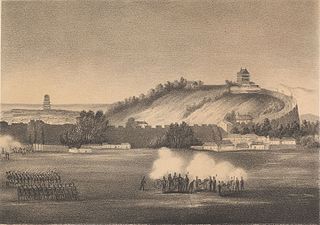
The Battle of Canton was fought by British and French forces against Qing China on 28–31 December 1857 during the Second Opium War. The British High Commissioner, Lord Elgin, was keen to take the city of Canton (Guangzhou) as a demonstration of power and to capture Chinese official Ye Mingchen, who had resisted British attempts to implement the 1842 Treaty of Nanking. Elgin ordered an Anglo-French force to take the town and an assault began on 28 December. Allied forces took control of the city walls on 29 December but delayed entry into the city itself until 5 January. They subsequently captured Ye and some reports state they burnt down much of the town. The ease with which the allies won the battle was one of the reasons for the signing of the Treaty of Tientsin in 1858.
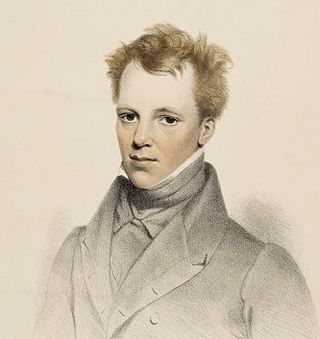
Robert Thom was an English nineteenth century Chinese language translator and diplomat based in Canton who worked for the trading house Jardine, Matheson & Co. and was seconded to the British armed forces during the First Opium War (1839 – 1842). For his literary works Thom used Sloth as a nom de plume.
Yang Fang (1770–1846) was a Han Chinese general and diplomat during the Qing dynasty (1644–1911). Born in Songtao, Guizhou Province, he joined the military as a young man and became a secretary, where he came to the attention of General Yang Yuchun, who recommended him for military school.
Lu Kun, was a Chinese politician of the Qing dynasty. He was a student of politician and scholar Ruan Yuan. He was born in Zhuozhou Prefecture, Shuntian Fu (顺天府).

The history of opium in China began with the use of opium for medicinal purposes during the 7th century. In the 17th century the practice of mixing opium with tobacco for smoking spread from Southeast Asia, creating a far greater demand.

The destruction of opium at Humen began on 3 June 1839, lasted for 23 days, and involved the destruction of 1,000 long tons of illegal opium seized from British traders under the aegis of Lin Zexu, an Imperial Commissioner of Qing China. Conducted on the banks of the Pearl River outside Humen Town, Dongguan, China, the action provided casus belli for Great Britain to declare war on Qing China. What followed is now known as the First Opium War (1839–1842), a conflict that initiated China's opening for trade with foreign nations under a series of treaties with the western powers.
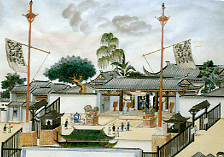
Hoppo or Administrator of the Canton Customs, was the Qing dynasty official at Guangzhou (Canton) given responsibility by the emperor for controlling shipping, collecting tariffs, and maintaining order among traders in and around the Pearl River Delta from 1685 to 1904.

Madagascar was a 19th-century paddle steamer that served the British Empire as a troop transport in the First Opium War, during which conflict an accidental fire destroyed her.
Events from the year 1839 in China.


